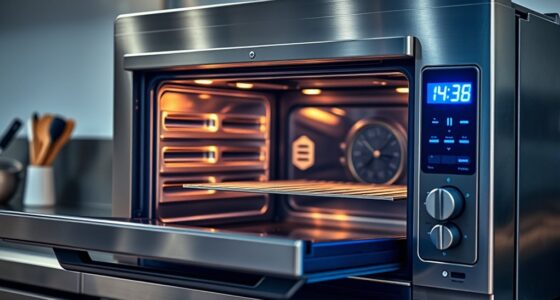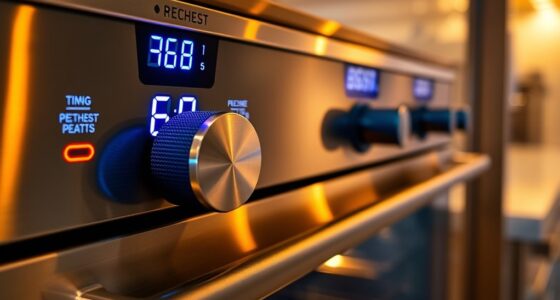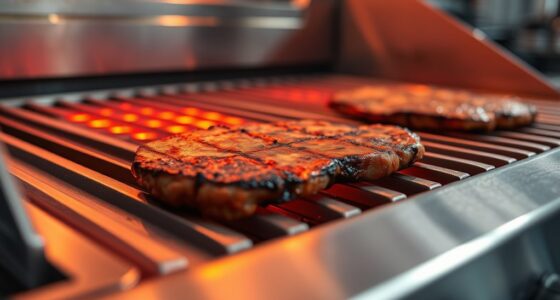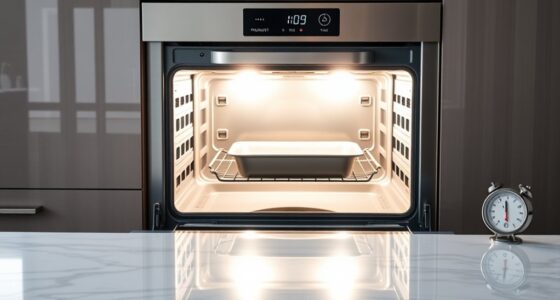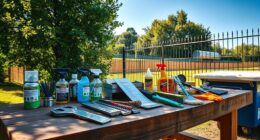To avoid costly mistakes with outdoor propane and natural gas, make certain you have proper ventilation and clearance around appliances, and choose equipment compatible with your fuel type. Don’t overlook local regulations or skip professional installation. Regularly inspect connections for leaks, maintain safety devices, and keep emergency shut-offs accessible. Also, consider fuel costs and availability. Staying aware of these key points and safety measures helps prevent hazards—continue exploring to learn more about safe outdoor gas use.
Key Takeaways
- Ensure proper ventilation and clearance to prevent gas buildup and environmental hazards.
- Confirm appliances are compatible with the specific gas type (propane or natural gas).
- Follow local regulations and obtain professional installation to avoid legal and safety issues.
- Regularly inspect and test connections for leaks, corrosion, or damage to maintain safety.
- Be aware of cost fluctuations, emergency shut-off locations, and safety procedures for preparedness.
Neglecting Proper Ventilation and Clearance

Neglecting proper ventilation and clearance can lead to serious safety hazards when using propane or natural gas outdoors. Insufficient ventilation creates ventilation hazards, increasing the risk of gas buildup and potential explosions. It’s vital to meet clearance requirements around grills, heaters, and other gas-powered equipment to prevent dangerous leaks or fire hazards. If you ignore these guidelines, you risk trapping gas fumes where they can accumulate, especially in enclosed or poorly ventilated spaces. Proper ventilation and adhering to clearance requirements aren’t just safety tips—they’re essential steps to keep you safe while enjoying outdoor gas appliances. Additionally, understanding natural environment considerations ensures your setup minimizes impact on local ecosystems and promotes sustainable outdoor practices.
Choosing the Wrong Gas Type for Your Equipment

Choosing the wrong gas type can lead to equipment damage or safety risks. You need to take into account compatibility, costs, and how easy it is to find the fuel. Making the right choice ensures safe operation and efficient performance. Additionally, understanding the projector technology involved can help you select the most suitable fuel type for your outdoor setup.
Compatibility With Equipment
Using the wrong type of gas can seriously harm your equipment or reduce its efficiency. To avoid this, verify proper equipment compatibility by confirming that your appliances are designed for either propane or natural gas. Appliance matching is essential because some units are built specifically for one gas type, and using the incorrect one can cause damage or poor performance. Check the manufacturer’s specifications or labels to confirm the correct fuel. Installing an appliance designed for propane into a natural gas line, or vice versa, can lead to issues like incomplete combustion, reduced heat output, or safety hazards. Always consult a professional if you’re unsure about your equipment’s compatibility, and never force a connection that isn’t intended for the specific gas type. Additionally, understanding the differences between propane and natural gas can help ensure you select the proper fuel for your outdoor setup.
Cost and Availability
When selecting between propane and natural gas, cost and availability play a crucial role in your decision. Propane requires dedicated fuel storage, like tanks, which can involve initial setup costs, while natural gas is typically supplied through existing pipelines, making it more convenient and often cheaper in the long run. Delivery options also matter—propane needs regular refills, depending on your usage, whereas natural gas is supplied continuously if your area has access. Consider your local infrastructure and how easily you can obtain either fuel type. If natural gas is readily available, it might be more cost-effective and hassle-free. However, if your property lacks pipeline access, propane’s storage and delivery may be more practical despite the higher ongoing costs. Additionally, the high-quality materials used in vetted appliances can influence your choice by ensuring long-term durability and performance.
Safety and Storage
Selecting the wrong type of gas for your outdoor equipment can lead to serious safety risks and damage. Using the incorrect gas, or mishandling cylinders, can cause leaks, fires, or explosions. To avoid these dangers, prioritize proper storage safety and careful cylinder handling.
Be alert to these hazards:
- Storing gas cylinders near heat sources or flames
- Moving or handling cylinders without proper training
- Forgetting to check for leaks before use
- Ignoring recommended storage guidelines
- Failing to secure cylinders in an upright position
Additionally, understanding the transformative power of decluttering can help you organize your storage area to reduce hazards and improve safety.
Choosing the right gas and following safety protocols can prevent accidents and ensure your outdoor space remains safe. Always handle cylinders with care, and store them in well-ventilated areas away from children and pets.
Overlooking Local Regulations and Permitting Requirements

Overlooking local regulations and permitting requirements can lead to costly delays or legal issues. Before installing propane or natural gas systems outdoors, you must understand permit requirements and adhere to local regulations. Many areas have specific codes for outdoor gas appliances, including setback distances, ventilation standards, and safety protocols. Failing to secure the necessary permits can result in fines, mandatory removal, or insurance complications. It’s your responsibility to research and comply with these rules before starting installation. Contact local authorities or building departments to clarify requirements and avoid surprises. Ignoring these regulations not only risks legal trouble but could also compromise safety and the integrity of your outdoor setup. Always prioritize checking permit requirements and sound design regulations to ensure a smooth, compliant installation.
Ignoring the Importance of Professional Installation

Skipping professional installation can lead to serious safety hazards and costly mistakes. Without expert guidance, you risk improper setup that could cause leaks, fires, or explosions. Relying on amateurs or DIY methods might seem cost-effective but often results in dangerous errors. Additionally, improper installation can diminish the effectiveness of safety devices like Alzheimer bracelets, increasing risks during emergencies. Be aware of these risks:
- Potential gas leaks endangering lives
- Increased fire hazards from improper connections
- Damage to property due to incorrect installation
- Voiding safety warranties and permits
- Higher costs from future repairs and repairs
Professional installation ensures your system is safe, compliant, and efficient. It provides peace of mind, knowing trained experts have correctly handled every connection and safety measure. Don’t compromise safety—trust the experts and prioritize proper installation.
Failing to Regularly Inspect and Maintain Gas Lines and Connections

You need to schedule regular inspections of your gas lines and connections to catch issues early. Make it a habit to check for leaks often and guarantee all fittings stay secure. Proper maintenance helps prevent dangerous failures and keeps your outdoor gas setup safe. Additionally, understanding the art of Italian espresso can inspire you to create a cozy outdoor coffee corner, enhancing your overall outdoor experience.
Schedule Routine Inspections
Regularly scheduling inspections of your gas lines and connections is essential to guarantee safety and prevent leaks. Routine checks help identify potential issues early, saving you from costly repairs and dangerous accidents. During inspections, focus on equipment calibration to assure peak performance. Neglecting these inspections can lead to hazardous leaks, fire risks, and costly damage. Additionally, considering the use of specialized vacuums for outdoor cleaning can help maintain a safe environment around your gas setup. Stay vigilant by:
- Conducting visual inspections for corrosion or damage
- Testing connection tightness regularly
- Ensuring vents are clear and unobstructed
- Verifying proper equipment calibration
- Addressing any irregularities immediately
These proactive steps give you peace of mind, protect your property, and keep your outdoor gas setup running smoothly. Don’t wait for a problem—schedule routine inspections now.
Check for Leaks Regularly
Since gas leaks can develop unexpectedly, it’s crucial to check your connections and lines for leaks on a regular basis. Regular inspections help prevent dangerous situations and guarantee outdoor safety. Start by applying a soap and water solution to all connections, looking for bubbles that indicate a leak. Pay close attention to your gas container and the entire piping system. If you detect any hissing sounds or smell gas, turn off the supply immediately and address the issue. Don’t rely on a one-time check—make it a routine to inspect your gas lines and connections regularly, especially before using outdoor appliances. Staying vigilant can save you from costly repairs and, more importantly, keep everyone safe. Consistent leak checks are essential for safe outdoor gas use. Proper maintenance ensures early detection of potential hazards and prolongs the lifespan of your gas equipment.
Maintain Connection Integrity
Over time, connections and fittings can loosen or degrade, increasing the risk of leaks or ruptures. Regularly inspecting and maintaining your gas lines is essential to guarantee proper gas pressure and equipment compatibility. Neglecting this can lead to dangerous leaks, system failures, or even explosions. Stay vigilant by checking for corrosion, wear, or damage at every connection point.
Be alert to signs of trouble:
- Unexpected drops in gas pressure
- Frayed or cracked hoses
- Corrosion or rust buildup
- Loose fittings or fittings that move
- Unusual smells or hissing sounds
Maintaining connection integrity safeguards your outdoor setup, preventing costly repairs and potential hazards. Make it a routine to tighten fittings, replace worn parts, and verify compatibility—your safety depends on it.
Misjudging the Cost and Availability of Fuel Sources

Many homeowners underestimate how the costs and availability of propane and natural gas can fluctuate over time. This misjudgment can lead to unexpected expenses and supply shortages. When doing fuel source comparisons, it’s crucial to take into account factors like regional supply, seasonal demand, and infrastructure changes that influence pricing. A thorough cost analysis helps you understand long-term affordability, rather than just initial prices. Natural gas tends to be more stable and often cheaper in areas with existing pipelines, but availability can vary if infrastructure is limited. Propane, while more flexible, might incur higher costs during supply disruptions or increased demand. Recognizing these fluctuations ensures you make informed decisions, avoiding surprises that could impact your outdoor setup’s efficiency and budget.
Using Incompatible Appliances or Accessories

Using appliances or accessories that aren’t compatible with your fuel source can cause serious problems, from safety hazards to efficiency issues. Incorrect appliance compatibility or poor accessory selection can lead to dangerous leaks, fires, or damage to your equipment. You might also experience poor performance or higher energy costs, wasting your resources and money. To avoid these risks, always verify that your appliances are designed for propane or natural gas.
Be cautious with accessory selection to ensure safety and efficiency. Don’t overlook the importance of matching your accessories to your fuel source.
- Using a propane grill with natural gas connections
- Installing incompatible regulators or hoses
- Choosing accessories not rated for your fuel type
- Using generic parts that don’t meet safety standards
- Ignoring manufacturer recommendations
Underestimating Safety Precautions and Emergency Measures

Neglecting to prioritize safety precautions and emergency measures can turn a manageable incident into a dangerous situation. Failing to plan for emergencies risks severe consequences, especially with propane or natural gas outdoors. You should always be prepared with fire safety protocols and clear procedures. Know how to shut off the gas supply quickly and have accessible fire extinguishers nearby. Regularly inspect equipment for leaks or damage, and ensure everyone understands emergency procedures. Here’s a quick overview:
| Safety Step | Action | Importance |
|---|---|---|
| Gas Leak Detection | Use soapy water to check connections | Prevents potential explosions |
| Emergency Shut-Off | Know location and operation | Stops gas flow immediately |
| Fire Safety Equipment | Keep extinguishers handy | Quickly suppress fires |
| Emergency Contacts | Post nearby and keep updated | Fast response to incidents |
Overlooking the Need for Proper Shut-Off Valves and Emergency Controls

Proper shut-off valves and emergency controls are vital components of a safe outdoor gas setup. Without them, you risk leaks, fires, or explosions if something goes wrong. You might overlook installing easy-to-access shut off valves or neglect testing emergency controls regularly. This can leave you vulnerable during a crisis, increasing danger for your family and property. Take action now to guarantee safety by:
- Installing easily reachable shut off valves
- Regularly testing emergency controls
- Clearly labeling all safety devices
- Keeping emergency controls unobstructed
- Educating everyone on how to use them quickly
These steps provide peace of mind, knowing you’re prepared to act swiftly in emergencies. Proper shut-off valves and emergency controls are your first line of defense—don’t underestimate their importance.
Frequently Asked Questions
How Do I Determine the Right Gas Type for My Outdoor Setup?
To determine the right gas type for your outdoor setup, start with gas type selection based on your heating needs and equipment compatibility. Assess your outdoor setup planning by considering factors like fuel availability, safety, and cost. Consult with professionals if needed to guarantee proper installation and efficiency. Remember, choosing the correct gas type ensures safe, effective operation and helps you avoid costly mistakes down the line.
What Are the Best Practices for Outdoor Gas Appliance Safety?
To guarantee outdoor gas appliance safety, regularly check for gas leaks and use soapy water on connections; never ignore the smell of gas. Follow ventilation requirements closely to prevent dangerous buildup of fumes. Keep appliances away from enclosed areas and clear of flammable materials. Always turn off gas supplies when not in use, and schedule professional inspections annually. These steps help prevent accidents and keep your outdoor space safe.
How Often Should Outdoor Gas Lines Be Inspected and Maintained?
Like tending a garden, your outdoor gas lines need regular care. You should schedule a gas line inspection and maintenance at least once a year to catch potential issues early. Regular maintenance helps prevent leaks, corrosion, and hazards, ensuring safety and efficiency. Don’t wait for problems to appear—staying proactive with your maintenance schedule keeps your outdoor appliances running smoothly and safely for years to come.
Are There Specific Permits Required for Outdoor Propane or Natural Gas Installations?
Yes, you need specific permits for outdoor propane or natural gas installations. Check your local regulations, as permit requirements vary by location. You must follow installation regulations to guarantee safety and compliance. Usually, a permit is necessary before starting the installation, and inspections might be required afterward. Always consult your local authority or a licensed professional to make sure you meet all the permit requirements and adhere to installation regulations.
How Can I Identify Compatible Accessories for My Gas-Powered Outdoor Equipment?
To guarantee seamless operation, you should start by verifying fuel compatibility, making sure your equipment matches the designated gas type. When selecting accessories, focus on accessory matching by checking manufacturer guidelines or labels for compatibility. This careful approach helps prevent potential issues. Always consult product manuals or contact the manufacturer if you’re unsure. Properly matching accessories ensures safety, efficiency, and longevity for your outdoor gas-powered equipment.
Conclusion
By avoiding these nine common mistakes, you’ll guarantee your outdoor gas setup is safe, efficient, and compliant. Proper ventilation, professional installation, and regular maintenance are key to preventing accidents. Are you willing to risk safety and costly repairs by overlooking these essentials? Take the time to do it right, so you can enjoy your outdoor space worry-free. Your safety and peace of mind depend on making informed choices now.


